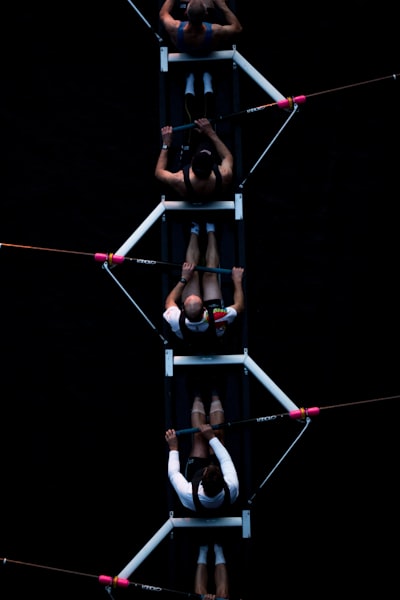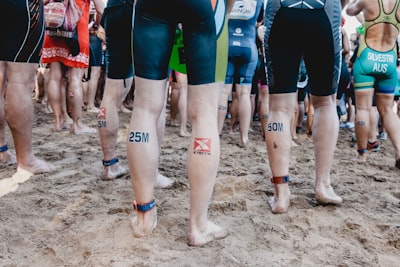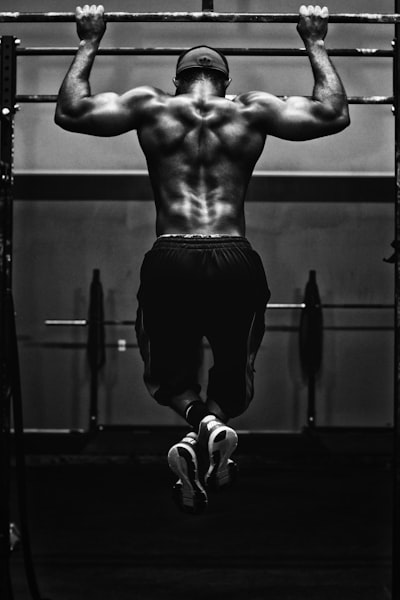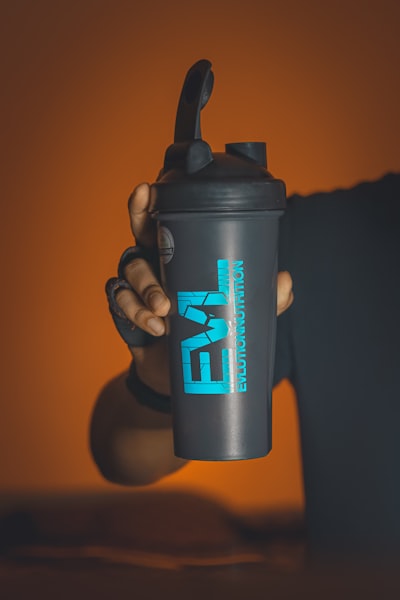Top Health Habits for High Athletes

Key Highlights
For top athletes, taking care of their mental health is a big part of staying well. When they train hard, it really affects them both in body and mind. Keeping everything balanced, including how they perform and feel overall, is super important for doing well over time. Eating right and making sure to drink enough water are key for being at the top of their game. Mental health isn’t just a small piece; it’s huge when it comes to winning or performing well because handling stress and bouncing back from tough times matters a lot. Also, getting plenty of rest helps with training without getting hurt.
Introduction

Lately, the stress and challenges that top athletes face have really been in the spotlight. This includes kids in high school sports too. Big names like Simone Biles, Naomi Osaka, and Michael Phelps have opened up about how key mental health is for feeling good overall. The COVID-19 pandemic has also shown us just how much stress, mental illness, and anxiety can mess with our minds. It’s super important to look after our mental well-being everywhere but focusing on it within high school sports and training is just as crucial.
Being part of competitive sports can be pretty tough on both your body and mind. All that hard work needed for top-level competition can cause physical pain along with feelings of sadness or worry. Plus, having to always perform well adds even more pressure which might lead to problems like anxiety or depression down the line. Finding a good balance between doing your best in sport while keeping healthy mentally is vital for these athletes’ success now and later on.
Understanding the Physical Demands on High-Level Athletes

Athletes, whether they’re playing sports in high school or at the professional level, go through a lot of tough physical activity. Their training is hard and competition fierce, which can really wear down their bodies and sometimes cause injuries. For those in high school who focus on just one sport all year round, there’s an even bigger chance of getting hurt from using the same muscles too much. It’s super important to get how demanding this can be so we can find ways to keep these athletes safe and healthy for a long time.
The Impact of Intensive Training on the Body

Training hard can be a double-edged sword for the body. On one hand, getting active is usually good for public health. But on the other, pushing yourself too much in sports can lead to physical pain and feeling down or anxious. Athletes often deal with injuries from doing the same movements over and over again, which isn’t just tough on their bodies but can mess with their minds too. It’s really important for athletes, along with their coaches and doctors, to pay attention to these issues so they can keep both their bodies and minds healthy.
Balancing Performance and Well-being
For top athletes, it’s really important to find the right mix of doing their best and feeling good. Even though they aim to be at the top of their game, this shouldn’t hurt their mental health or how well they feel overall. These athletes usually deal with a lot because there’s so much pressure in sports. But if they take care of their mental health, it can actually do them a lot of good and help them succeed for a long time. It’s key that these athletes know it’s okay to focus on feeling well and have support when things get tough mentally. This way, we can make sure sports are both successful and healthy places for everyone involved.
Nutrition Strategies for Peak Performance

For athletes who are really pushing their limits, eating right is super important for both their performance and overall health. Making sure they get the right kind of food before, during, and after workouts or competitions can make a big difference in how well they do. It’s all about having a good mix of carbs, proteins, and fats that are good for you. Drinking enough water is just as crucial to keep hydration levels up. During tough workouts or events, sports drinks might be handy since they help replace lost electrolytes and give an energy boost. Building healthy eating habits plays a huge part in reaching top performance levels and improving athletic skills by focusing on proper nutrition related to physical activity including maintaining hydration with fluids like sports drinks.
Essential Nutrients for Athletic Excellence
To do really well in sports, eating right is super important. Here’s what athletes need to eat to stay on top of their game:
- Carbohydrates: These are like the main battery for your muscles when you’re moving around or playing sports. It’s key that athletes get enough carbs so they don’t run out of steam.
- Proteins: After a tough workout or game, proteins help fix and build up your muscles again. Good protein sources include things like chicken, fish, tofu, and beans.
- Healthy Fats: Foods with good fats in them—think avocados, nuts, and olive oil—not only give you energy but also keep you healthy overall.
Besides these nutrients, it’s crucial for athletes to not forget about vitamins and minerals such as iron and calcium which are big players in keeping you healthy and boosting how well you perform athletically. On the day of a big event or match (game day), sticking to foods that won’t upset your stomach but will keep giving you energy all through is smart planning.
Hydration: The Cornerstone of Athletics Performance
Staying well-hydrated is key to doing your best in sports. When athletes don’t drink enough water, it can mess with both their bodies and minds, making them perform worse and putting them at a higher risk for getting sick from the heat. It’s important for athletes to drink plenty of fluids before, during, and after they train or compete. Experts in sports medicine have an important job teaching athletes and their coaches how crucial hydration is. They also help by giving advice on how to keep the right balance of fluids in the body. Lately, more people are paying attention to how not drinking enough affects athletes. This has led to better efforts aimed at making sure those involved in sports understand how essential it is to stay hydrated.
The Role of Mental Health in Athletic Success
Mental health plays a key role in the success of athletes. Those who compete at high levels encounter special challenges that can affect their mental state. Yet, there’s usually a stigma attached to mental health among athletes, making it hard for them to reach out for help and support. It’s crucial to encourage open talks about mental health and build an atmosphere where athletes are okay with sharing their difficulties. By tackling mental health conditions and offering the right kind of support, we can help athletes do better both in their sport and in life outside of it.
Identifying and Managing Stress and Anxiety
For young athletes, especially those playing sports at a high level, feeling stressed and anxious is pretty common. With the need to do well, live up to what’s expected of them, and juggle lots of different tasks, it’s no wonder they can feel overwhelmed. It’s really important to spot when these young players are struggling with stress or anxiety so we can help them out. There are some good ways to deal with these feelings like doing relaxation exercises, taking deep breaths, practicing mindfulness or even talking things through with coaches, parents or folks who know a lot about mental health. By tackling these issues straight on, young athletes can become tougher mentally and feel better in their minds.
Techniques for Building Mental Resilience on High Athletes Health
For athletes, especially those moving up to college sports, it’s really important to build mental toughness. The worry about getting hurt and the need to do well can be a lot to handle. Here are some ways athletes can get stronger mentally:
- Making goals that you can actually reach helps build your confidence and keeps you motivated.
- Talking positively to yourself: Keeping an upbeat conversation going in your head can help you push through tough times.
- Imagining winning: Using visualization techniques makes it easier for athletes to get ready for games and feel more confident.
- Getting support from others: Being part of a team with coaches, other players, and even talking with professionals who know about mental health creates a solid network of support.
By using these strategies, athletes have better chances at dealing with whatever comes their way in sports while keeping their mental health strong despite the fear of injury.
Importance of Sleep and Recovery in Athletic Training
For high school athletes, getting enough sleep and taking time to recover is super important. Sleep helps with muscle repair, thinking clearly, and just feeling good overall. With all the stuff they have going on like classes, sports practices, and other activities, it’s easy for them not to get enough rest. It’s really key that these athletes make sure they’re sleeping well. On top of that, doing things like stretching out muscles properly using a foam roller or making sure there are days off built into their schedules can help keep injuries away and let them do their best in whatever sport they play.
Optimizing Sleep for Muscle Recovery
For athletes, getting enough sleep is key to helping their muscles recover after working out. While they’re asleep, their bodies get busy fixing and rebuilding any muscle tissue that got damaged during exercise. It’s really important for them to make sure they’re sleeping well if they want the best muscle recovery possible. They should try to get between 7-9 hours of solid sleep every night so their bodies can do what they need to do. To help with this, there are a few things athletes can do like sticking to a regular bedtime schedule, making sure where they sleep is nice and comfy for snoozing, doing some relaxing stuff before hitting the hay, and not staring at screens right before bed. By focusing on good sleep habits, athletes will not only see better results in how quickly their muscles bounce back but also up their game overall and cut down on getting hurt.
Rest Days: An Integral Part of Training Regimens
Taking breaks is super important for athletes because it gives their bodies a chance to fix themselves and chill out. If they keep pushing hard without enough rest, they might get hurt from using their body too much, feel really tired, or not do as well in sports. These off days are like a timeout for the body to heal up, calm down any swelling, and get back the energy that was used up. Coaches and those who play sports need to make sure they’re taking these breaks seriously to avoid getting hurt. The NCAA (National Collegiate Athletic Association) knows how crucial rest days are too; that’s why they’ve set some rules so athletes have enough time to bounce back after training hard. By making sure there are rest days planned in their schedules, athletes can be at the top of their game more often and lower the chances of injuries related to overuse or other issues.
Injury Prevention and Management
In the world of top-notch sports, keeping injuries at bay and taking care of them properly is super important. When athletes get hurt, it can really throw off their game and affect how they feel overall. Athletic departments are key players in making sure athletes stay safe. They do this by setting up rules to prevent injuries and helping out when someone does get hurt. This means doing things like warming up before starting, cooling down after finishing, following workout plans that build strength without overdoing it, and having experts around who know all about sports health. By putting a spotlight on avoiding injuries and handling them right if they happen, athletes can dodge serious harm that could mess with their fitness levels or performance for a long time.
Common Injuries Among High-Level Athletes and How to Avoid Them
Athletes who push their bodies hard often face typical injuries because of the intense physical work their sports require. Injuries from doing too much, like stress fractures and tendonitis, happen a lot to those who train hard and do the same movements over and over. To avoid these kinds of problems, it’s crucial for athletes to mix up their training routines with different activities and make sure they take days off to rest. Listening to what your body is telling you is also key; if something hurts or doesn’t feel right, getting help from a doctor is important. By taking steps early on to prevent injury and dealing with any issues quickly when they come up, athletes can keep themselves from more serious harm down the line while keeping up top performance levels.
Rehabilitation and Returning to Sport Post-Injury
Rehabilitation is super important for athletes getting back on their feet after an injury. It’s all about a well-rounded plan that covers physical therapy, building strength again, and slowly upping the training game. The American Academy of Pediatrics has set some rules to follow depending on what kind of injury it is and what the athlete needs personally. These guidelines are there to help get strength, flexibility, and function back while making sure injuries don’t happen again. For athletes, sticking close to their healthcare team and following these rehab steps closely is key for a good comeback in sports.
Integrating Technology and Sports Science
With the help of new tech and sports science, how athletes get ready for competition has totally changed. Now, they can really dig into details about their performance, health, and how well they bounce back after exerting themselves. By using technology in their training routines, athletes have a way to keep an eye on their progress and see where they need to do better so that they can be at the top of their game. Sports science looks into many areas like biomechanics (how bodies move), nutrition (what you eat), and psychology (how your mind affects your body) to give athletes all-around support as they grow. Organizations like the National Athletic Trainers’ Association (NATA) are there with advice and rules on how best to bring tech and sports science together in athletic programs.
Wearables and Tracking Devices for Monitoring Performance
Athletes are now using wearables and tracking gadgets more than ever to keep an eye on their performance and health stats. These tools offer instant updates on things like heart rate, how well they sleep, the number of steps taken, among other key details. With this information in hand, athletes can better plan their workouts, rest periods, and take care of their health as a whole. On top of that, these devices play a crucial role in spotting problems early on such as too much training or not enough downtime which could lead to injuries if ignored. It’s vital for athletes to pick out devices that give accurate results and fit well with what they need.
Advances in Sports Science Supporting Athlete Health
Advances in sports science have had a significant impact on athlete health and performance. Data analytics and machine learning algorithms have allowed for the development of personalized training programs tailored to each athlete’s specific needs and goals. This individualized approach can help optimize performance while minimizing the risk of injuries. Additionally, advancements in nutrition research have led to a greater understanding of the role of proper nutrition in supporting athlete health. Sports science is also being leveraged to improve public health, with initiatives aimed at promoting physical activity and preventing injuries among young athletes.
Text table: Benefits of Integrating Technology and Sports Science
| Benefits | Description | |
| Improved performance monitoring | Technology allows athletes to track their performance metrics in real time. | |
| Injury prevention and early detection | Wearables and tracking devices can help identify potential issues and prevent injuries. | |
| Personalized training programs | Sports science enables the development of personalized training programs for athletes. | |
| Enhanced recovery and rehabilitation | Technology can assist in monitoring and optimizing recovery and rehabilitation protocols. | |
| Data-driven decision-making | Data analytics provide valuable insights for athletes and coaches to make informed decisions. |
Conclusion
Top athletes need to look at their health and performance from all angles. This means they have to balance tough workouts with taking care of their mental health, eating right, staying hydrated, and getting enough rest. It’s also important for them to know how much strain they’re putting on their bodies, handle stress well, avoid injuries, and use technology that can help them out. By following these key healthy habits closely, athletes can boost how well they perform in the long run while keeping themselves fit both physically and mentally. Keeping an eye on both physical fitness and mental wellness is essential for reaching the highest levels of athletic achievement.
Frequently Asked Questions
What Are the Signs of Overtraining?
Overtraining is something a lot of top athletes worry about because it can mess with their body and mind. When someone trains too much, they might feel super tired, not do as well in sports, get sick more easily, have trouble sleeping, and feel moody or sad. It’s really important for these athletes to pay attention to what their bodies are telling them. They need to make sure they’re taking breaks when necessary and getting help from coaches or health experts if they think overtraining is happening. Finding the right mix of exercise, rest, and time off is key to staying at the top of their game while keeping both physical shape and mental health in check.
How Can Athletes Balance School/Work and Training?
For high-level athletes, juggling school or work with training can be tough. However, if they plan well and get the right support, achieving a good balance is definitely doable. Managing their time wisely is crucial. They need to figure out what’s most important and set up a timetable that gives them enough time for practice, study sessions, and some much-needed rest. Talking things through with coaches, teachers, or bosses helps make sure athletes get the backing they need to keep everything on track. Getting extra academic help from tutors or joining study groups can also take off some pressure. By having people around who understand and communicate openly about what’s going on makes it easier for athletes to handle both their sporting ambitions and educational or work commitments effectively.
https://sports-safety.hss.edu/courses
https://australia.rugby/about/codes-and-policies/safety-and-welfare/concussion-management
https://creativecommons.org/licenses/by/4.0
https://publicfiles.fcc.gov/tv-profile/WHP-TV
https://health.clevelandclinic.org/mental-health-in-athletes
